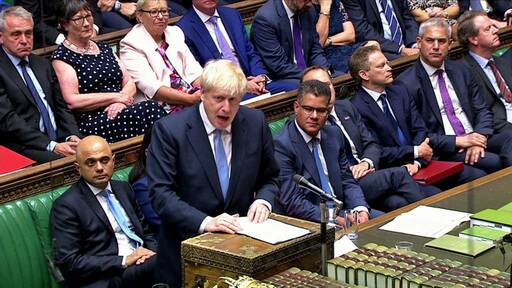On small and bigger lies – Isaac Chotiner talking to David Runciman, a professor of politics at Cambridge University about Boris J.
‘When you said that his undoing was about Brexit, or the consequence of Brexit, what did you mean?
I don’t think his undoing was a consequence of Brexit. His premiership happened because of Brexit, and the consequences of Brexit will long outlast him. I think his undoing was him. In the end, he couldn’t put together a government. He lost the ability to persuade enough people in his party and in Parliament to support him.
A year ago, he was fine. A year ago, he was doing that kind of politics, and he still had the support of his party, and there was no reason to think he wouldn’t potentially be Prime Minister for ten years. It’s not that in the last year the consequences of Brexit have finished him off. What destroyed him was his inability to get people in his government willing to go out and lie on his behalf day after day. I mean, in the end, what destroyed him over the last week is the fact that too many people in his Cabinet had simply got sick of saying things which turned out the next day not to be true.’
(…)
‘You said he’s purely a pragmatic, transactional politician, which is how a lot of people have thought about him for a while. Did anything change there? Do you think he believes anything?
I mean, everyone believes something, right? I don’t think he’s purely cynical. I think he’s quite set in his ways. He probably has quite a strong streak of political romanticism in him. I think he believes in a great-man theory of politics—“cometh the hour, cometh the man.” These are all quite deep-seated beliefs, but they are focussed on himself. Part of why this will have come as such a shock to him is that Brexit seemed like his moment, but even he realized there was something a bit contrived about that. I don’t think he believed in Brexit as a project.
He completely believes in the Ukraine war project. I think he really thought that was his moment of destiny, and to have that taken away from him will be the most painful part of this. He was asked repeatedly over recent months whether there was anything that would lead him to resign, and the only example he ever gave was, basically, “If I couldn’t persuade my colleagues of the rightness of my policy on Ukraine and our willingness to stand with the Ukrainians through thick and thin, I would then resign.” He believes in things like that. He has some idea of freedom, which would come close to a sort of worldview, but it’s all filtered through his own ability to exercise power. It’s a belief about being able to shape the world by having the power to do it. What it’s not is an ideology, for sure.
Where do you think the Ukraine feeling stems from? He compares himself to Churchill, and he wrote a book about Churchill, but is there something about Ukraine that speaks to him?
I don’t know, but it does make a certain kind of sense, because he genuinely believes in the value of political courage. There’s no question that he was awestruck by Zelensky, certainly at the beginning. He thinks his own political career is an exercise in courage. In his resignation address, you could tell he thinks the failure of the people who deserted him was about their cowardice, that they couldn’t withstand the media pressure of being in that storm. His whole political career has been about the idea that if you can outlast people, you’ll win. He sees something vicariously in Ukraine. It’s an extraordinary form of vanity, but I think he sees something of himself in Ukraine.
He also has an old-fashioned view, created by the Cold War, of the need to defend the West, and he sees this as the new front line. It made sense in Brexit terms, that Britain was able to play a bigger role, which Britain was, in supporting Ukraine, and that this showed that Britain on the world stage outside of the European Union has a kind of free hand to follow its instinct. All of those things make sense as part of who Johnson is.’
Read the article here.
I would say that it was the pettiness of his lies that made his party members puke, and also: there is no bigger pleasure than to stab in comrade in the back, especially a comrade that you could not stand.
Also, the fact that BJ didn’t believe in Brexit, but that he did believe in defending Ukraine rings true to me. This makes him a rather tragic figure, he wanted to be Churchill, but he reminded too many people of Trump. And the English like their own sort of populism.
There is of course this particular English vulgarity, but not all vulgarity works well in politics. There is a longing for understatement in the UK, even among those who have embraced the vulgarity.
Vulgarity and the understatement can go hand in hand. This is why English comedy can be delightful. And I know, some of my best friends hate Mr. Bean.
Whereas in the US and maybe also in other places, the vulgarity has become an ideal, the more vulgar you are the more honest you are.
